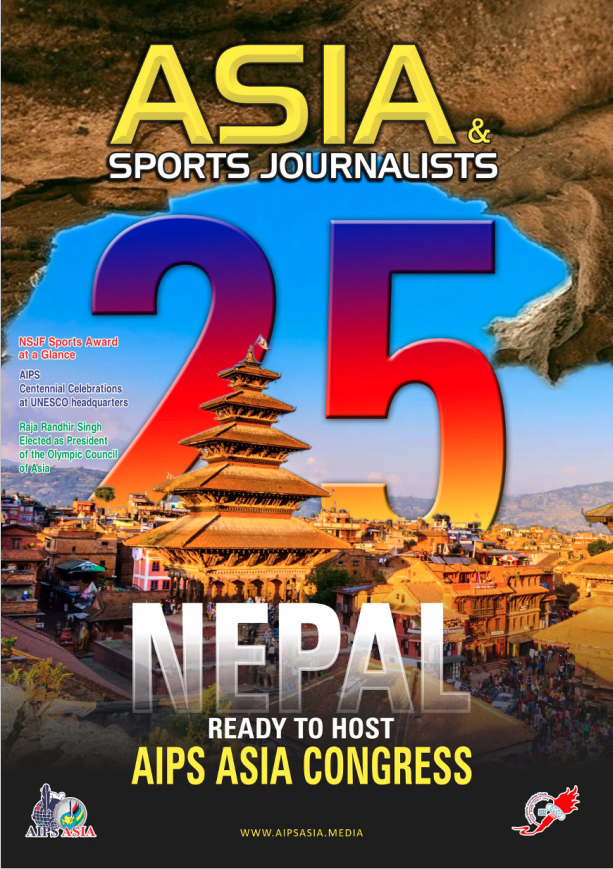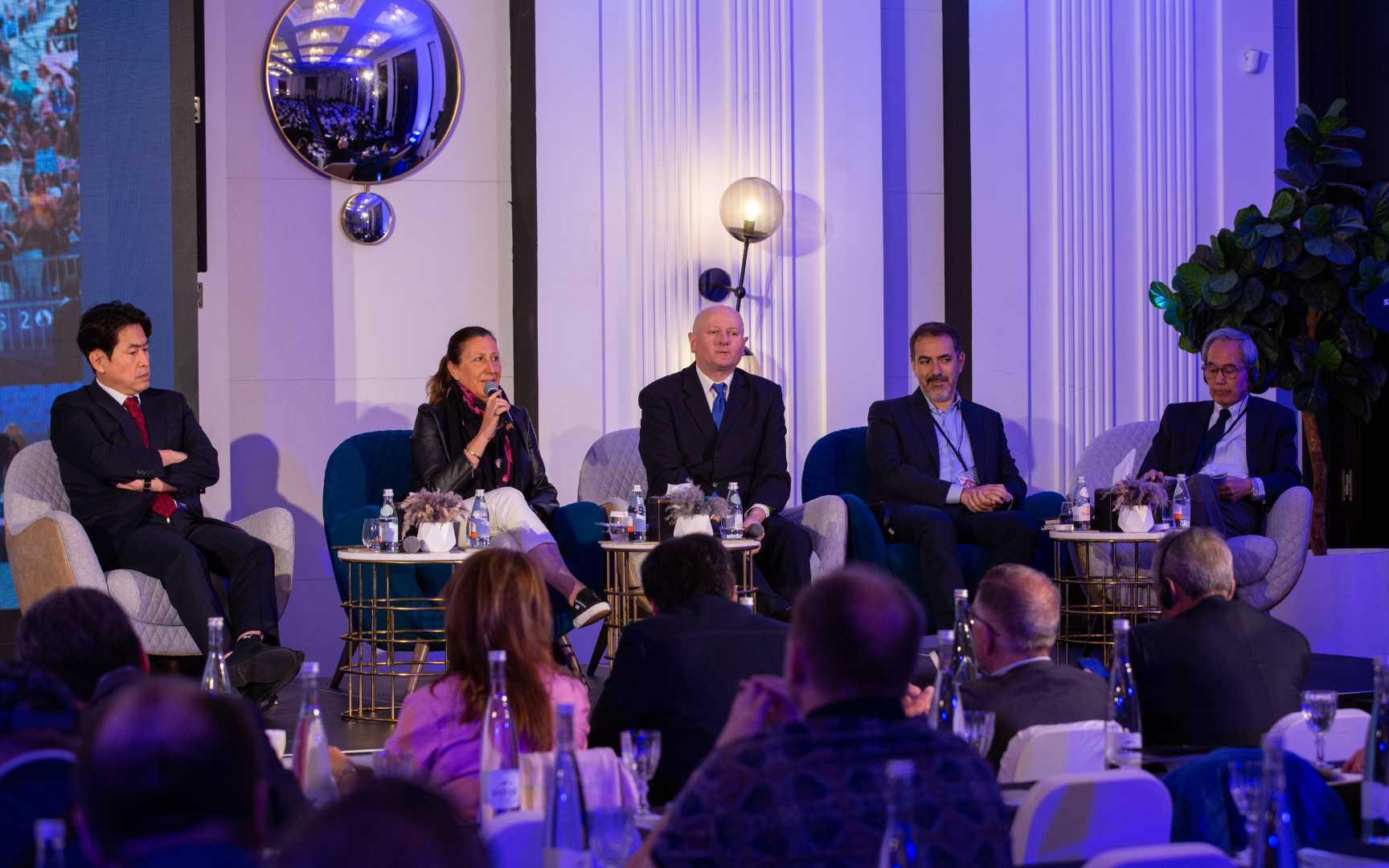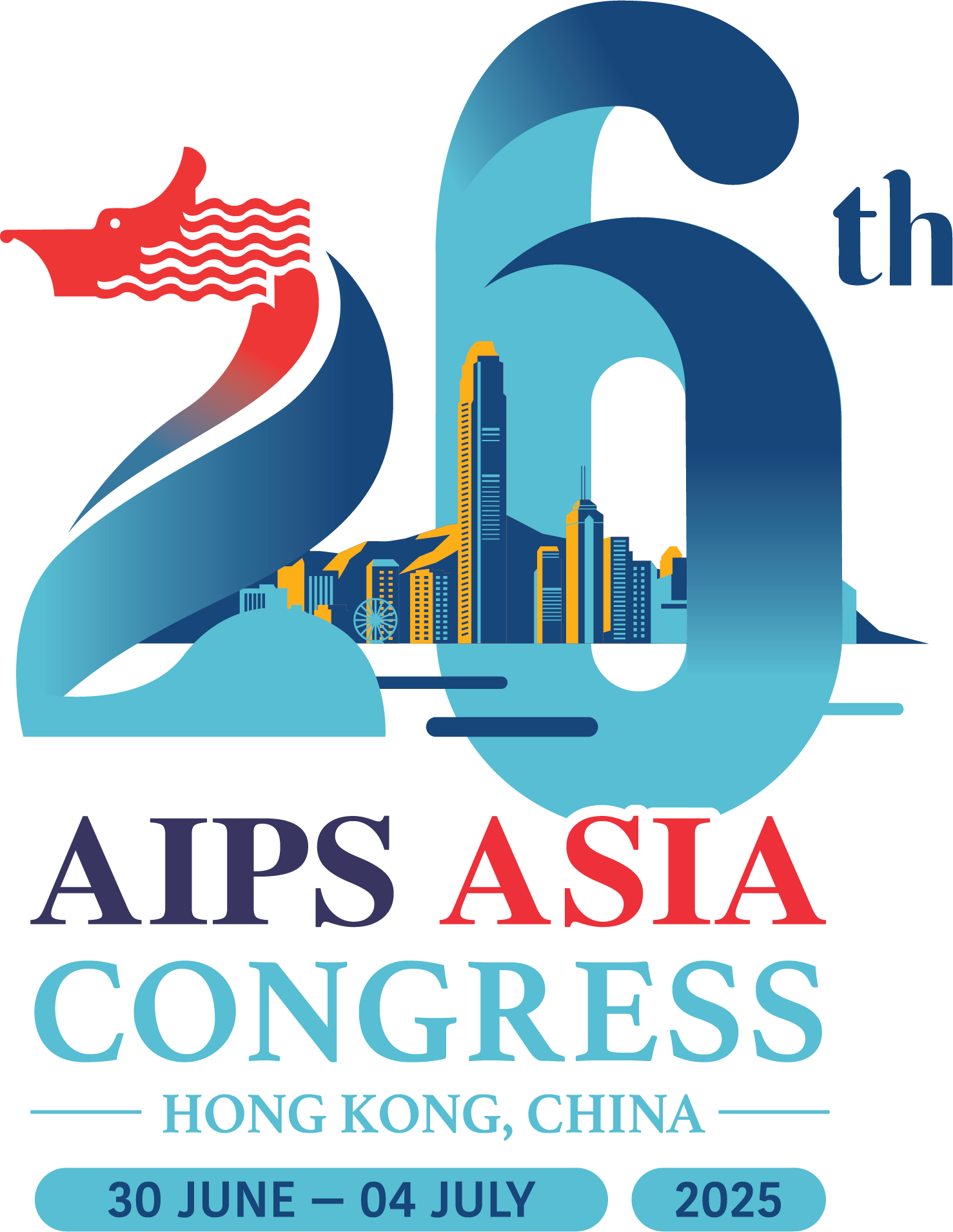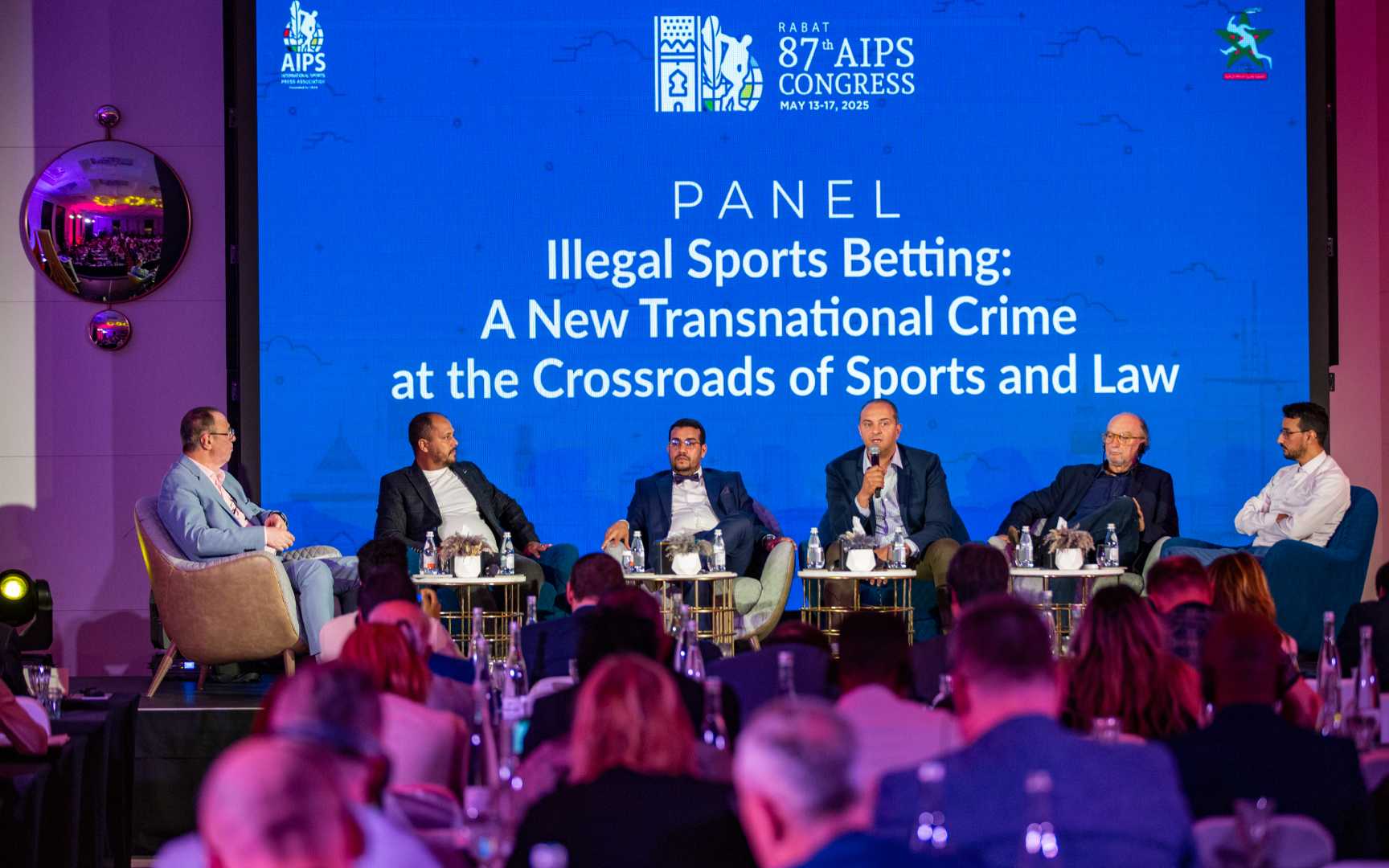All News
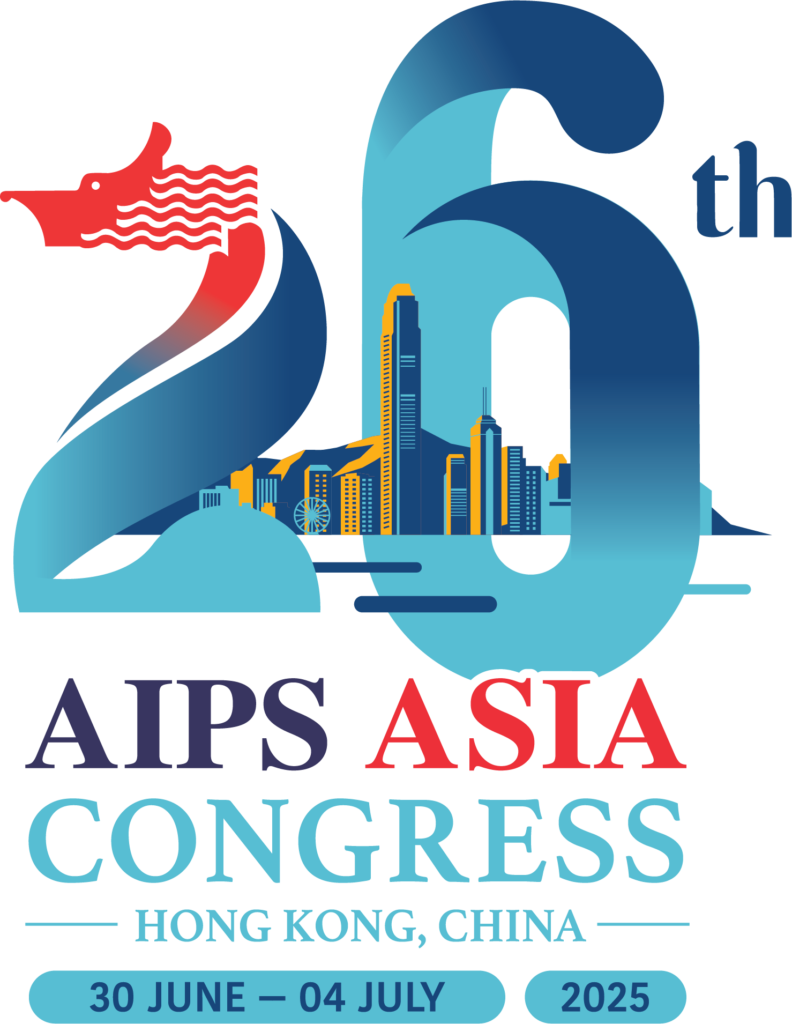
AIPS Congress debates integration of content creators in the sports media ecosystem
RABAT, May 15, 2025 – Some AIPS members have expressed concern that content creators pose a threat to traditional journalism, and are wary of their increasing presence in press areas at sports events.
This issue was on the front burner on Day 2 of the 87th AIPS Congress in Rabat, Morocco in a panel discussion that featured Lucia Montanarella – IOC’s Associate Director Olympic Games Media Operations, Zacharias Vailakis – Head of Media Operations at World Athletics, and members of the AIPS Content Creator Working Group.
BACKGROUND The content creator debate began to gather momentum at the 2023 World Athletics Championships in Budapest, and this led to the creation of an AIPS Working Group at the 2024 AIPS Congress in Santa Susanna. The group, made up of EC members Joze Zidar, Hiroshi Takeuchi, Hee Don Jung and Ioannis Daras, was tasked with studying the situation and proposing solutions that respect everyone’s right to work.
As Zidar explained in his introduction, the Working Group has produced a two-page document, which is aimed at recognising content creators that adhere to journalism ethics and standards. He stressed that the document, which will be constantly updated as the situation evolves, will not only be distributed to AIPS member associations but also to sports federations and organisations, because AIPS is committed to ensuring that professional journalists are not undermined or sidelined due to the influx of content creators.
While acknowledging the growing influence of content creators, both Takeuchi and Jung also underscored the need to regulate their activities. “We should set clear rules to help content creators and traditional journalists work together, because I believe content creators will be more powerful and influential in the future,” Jung said.
Sports federations are also monitoring this development, and Zidar pointed out that the AIPS Working Group has been in consultation with World Athletics and the IOC. World Athletics created a different category for content creators in its press accreditation process following the Budapest 2023 controversy, which included congestion in the mixed zone and some issues at press conferences.
CONTENT CREATOR ACCREDITATION Vailakis explained that content creators were accredited as media for the World Championships in Budapest because “we had no other category to accredit them, and we wanted the diverse coverage some of them can offer for our sport.” Now they have the content creator accreditation which is managed directly by World Athletics, not by the member federations, like press and photo is managed. “We are trying to accredit them based on merit. So we check the content, the quality, the relevance with athletics, the followers,” Vailakis said, adding that at the 2024 World Indoor Championships in Glasgow, they created a separate area at the very end of the mixed zone for the content creators.
“Obviously, the starting point for us was to define who the individual content creator is for World Athletics. It’s someone who has no affiliation with any media organisation, no commercial affiliations, and they are working for their own social media channels. I must also clarify that content creators working for established media organisations, international news agencies, official World Athletics partners and rights-holders are still accredited through those organisations quotas.”
BIG ROLE At the IOC, which deals with multiple sports, Montanarella explained that at the moment content creators are not recognised. However, within the IOC Press Committee there’s a Working Group – chaired by Associated Press Global Sports Editor Ricardo Zuniga – that is working independently on the subject, and last November they presented their recommendations to the committee.
“First of all, I think we all agree that in the world of communication nowadays, there is a big role played by what we call content creators, either in a media organization or by themselves. They promote events and cover events. This is a reality. So because it’s a reality, because like World Athletics, we run an accreditation process, and we received a lot of accreditation requests for Paris – which we denied, we obviously realize that there is a large group of people out there that are legitimately doing their job, and we need to find a way to recognize them.”
TRICKY PATH Montanarella said the recommendations of the IOC Working Group, of which Vailakis is also a member, include the suggestion of creating a category for content creators. But that is a tricky path to tread at the moment because content creators, who are more interested in creating video content, will go into immediate conflict with media rights-holders. “The IOC recognizes that there is the population out there that we have to look after, because they have a role in media and in the coverage of the Games. We are trying to work and find compromises, because it’s all about compromises with the media rights-holders and how these people can be brought in, making sure that they do their job respecting a code of conduct that obviously needs to work out.”
AIPS Congress delegates shared diverse opinions on the topic.
ENTERTAINMENT OR JOURNALISM Cătălin Țepelin, president of the Romanian Sports Press Association said: “If this is not the Congress of the content creators, but the Congress of the sports press professionals, then we should focus on how to protect our profession, not how we have to integrate others. So for me, we have to draw the line between entertainment and journalism.” He stressed that most of the content creators just promote what they are paid for, which is not journalism, but PR or entertainment. The hard work, the everyday coverage is done by us, the professional journalists. The others are coming just for the party, for the money. So we should protect our access, our own work areas without mixing things up.”
A CHANGING LANDSCAPE AIPS Vice-President Evelyn Watta from Kenya shared a different view: “For now, we are labelling them as content creators, but it’s a very thin line. Tomorrow, I might not have a job and then I cross to the other side and I become a content creator because I decide to create content for my social media followers. And that is what is happening. For instance, a lot of the content creators in Kenya are ex-sports journalists but because the landscape is changing, they have lost their jobs. But they still want to be in sports media.
“So I’m not fearful about this. I’m actually very proud that it gives us room to grow. If I’m out on the other side, I can still be able to continue practising. So for me, I think we need to stick to creating the rules and the ethics.”
RIGHT TO WORK AIPS President Gianni Merlo emphasised that the matter is very delicate and suggested the creation of working groups at the continental level to address the different challenges in every country. “We are content creators too, because we create something every time. The problem is, we cannot say that these people cannot work – that goes against human rights. Everybody has the right to have a job and make money, but we must make regulations.”
Thursday’s insightful debate is seen as an important step towards finding the right balance in an ever-evolving media landscape.
Courtesy AIPS
AIPS Congress debates integration of content creators in the sports media ecosystem
RABAT, May 15, 2025 – Some AIPS members have expressed concern that content creators pose a threat to traditional journalism, and are wary of their increasing presence in press areas at sports events.
This issue was on the front burner on Day 2 of the 87th AIPS Congress in Rabat, Morocco in a panel discussion that featured Lucia Montanarella – IOC’s Associate Director Olympic Games Media Operations, Zacharias Vailakis – Head of Media Operations at World Athletics, and members of the AIPS Content Creator Working Group.
BACKGROUND The content creator debate began to gather momentum at the 2023 World Athletics Championships in Budapest, and this led to the creation of an AIPS Working Group at the 2024 AIPS Congress in Santa Susanna. The group, made up of EC members Joze Zidar, Hiroshi Takeuchi, Hee Don Jung and Ioannis Daras, was tasked with studying the situation and proposing solutions that respect everyone’s right to work.
As Zidar explained in his introduction, the Working Group has produced a two-page document, which is aimed at recognising content creators that adhere to journalism ethics and standards. He stressed that the document, which will be constantly updated as the situation evolves, will not only be distributed to AIPS member associations but also to sports federations and organisations, because AIPS is committed to ensuring that professional journalists are not undermined or sidelined due to the influx of content creators.
While acknowledging the growing influence of content creators, both Takeuchi and Jung also underscored the need to regulate their activities. “We should set clear rules to help content creators and traditional journalists work together, because I believe content creators will be more powerful and influential in the future,” Jung said.
Sports federations are also monitoring this development, and Zidar pointed out that the AIPS Working Group has been in consultation with World Athletics and the IOC. World Athletics created a different category for content creators in its press accreditation process following the Budapest 2023 controversy, which included congestion in the mixed zone and some issues at press conferences.
CONTENT CREATOR ACCREDITATION Vailakis explained that content creators were accredited as media for the World Championships in Budapest because “we had no other category to accredit them, and we wanted the diverse coverage some of them can offer for our sport.” Now they have the content creator accreditation which is managed directly by World Athletics, not by the member federations, like press and photo is managed. “We are trying to accredit them based on merit. So we check the content, the quality, the relevance with athletics, the followers,” Vailakis said, adding that at the 2024 World Indoor Championships in Glasgow, they created a separate area at the very end of the mixed zone for the content creators.
“Obviously, the starting point for us was to define who the individual content creator is for World Athletics. It’s someone who has no affiliation with any media organisation, no commercial affiliations, and they are working for their own social media channels. I must also clarify that content creators working for established media organisations, international news agencies, official World Athletics partners and rights-holders are still accredited through those organisations quotas.”
BIG ROLE At the IOC, which deals with multiple sports, Montanarella explained that at the moment content creators are not recognised. However, within the IOC Press Committee there’s a Working Group – chaired by Associated Press Global Sports Editor Ricardo Zuniga – that is working independently on the subject, and last November they presented their recommendations to the committee.
“First of all, I think we all agree that in the world of communication nowadays, there is a big role played by what we call content creators, either in a media organization or by themselves. They promote events and cover events. This is a reality. So because it’s a reality, because like World Athletics, we run an accreditation process, and we received a lot of accreditation requests for Paris – which we denied, we obviously realize that there is a large group of people out there that are legitimately doing their job, and we need to find a way to recognize them.”
TRICKY PATH Montanarella said the recommendations of the IOC Working Group, of which Vailakis is also a member, include the suggestion of creating a category for content creators. But that is a tricky path to tread at the moment because content creators, who are more interested in creating video content, will go into immediate conflict with media rights-holders. “The IOC recognizes that there is the population out there that we have to look after, because they have a role in media and in the coverage of the Games. We are trying to work and find compromises, because it’s all about compromises with the media rights-holders and how these people can be brought in, making sure that they do their job respecting a code of conduct that obviously needs to work out.”
AIPS Congress delegates shared diverse opinions on the topic.
ENTERTAINMENT OR JOURNALISM Cătălin Țepelin, president of the Romanian Sports Press Association said: “If this is not the Congress of the content creators, but the Congress of the sports press professionals, then we should focus on how to protect our profession, not how we have to integrate others. So for me, we have to draw the line between entertainment and journalism.” He stressed that most of the content creators just promote what they are paid for, which is not journalism, but PR or entertainment. The hard work, the everyday coverage is done by us, the professional journalists. The others are coming just for the party, for the money. So we should protect our access, our own work areas without mixing things up.”
A CHANGING LANDSCAPE AIPS Vice-President Evelyn Watta from Kenya shared a different view: “For now, we are labelling them as content creators, but it’s a very thin line. Tomorrow, I might not have a job and then I cross to the other side and I become a content creator because I decide to create content for my social media followers. And that is what is happening. For instance, a lot of the content creators in Kenya are ex-sports journalists but because the landscape is changing, they have lost their jobs. But they still want to be in sports media.
“So I’m not fearful about this. I’m actually very proud that it gives us room to grow. If I’m out on the other side, I can still be able to continue practising. So for me, I think we need to stick to creating the rules and the ethics.”
RIGHT TO WORK AIPS President Gianni Merlo emphasised that the matter is very delicate and suggested the creation of working groups at the continental level to address the different challenges in every country. “We are content creators too, because we create something every time. The problem is, we cannot say that these people cannot work – that goes against human rights. Everybody has the right to have a job and make money, but we must make regulations.”
Thursday’s insightful debate is seen as an important step towards finding the right balance in an ever-evolving media landscape.
Courtesy AIPS

Video Gallery



